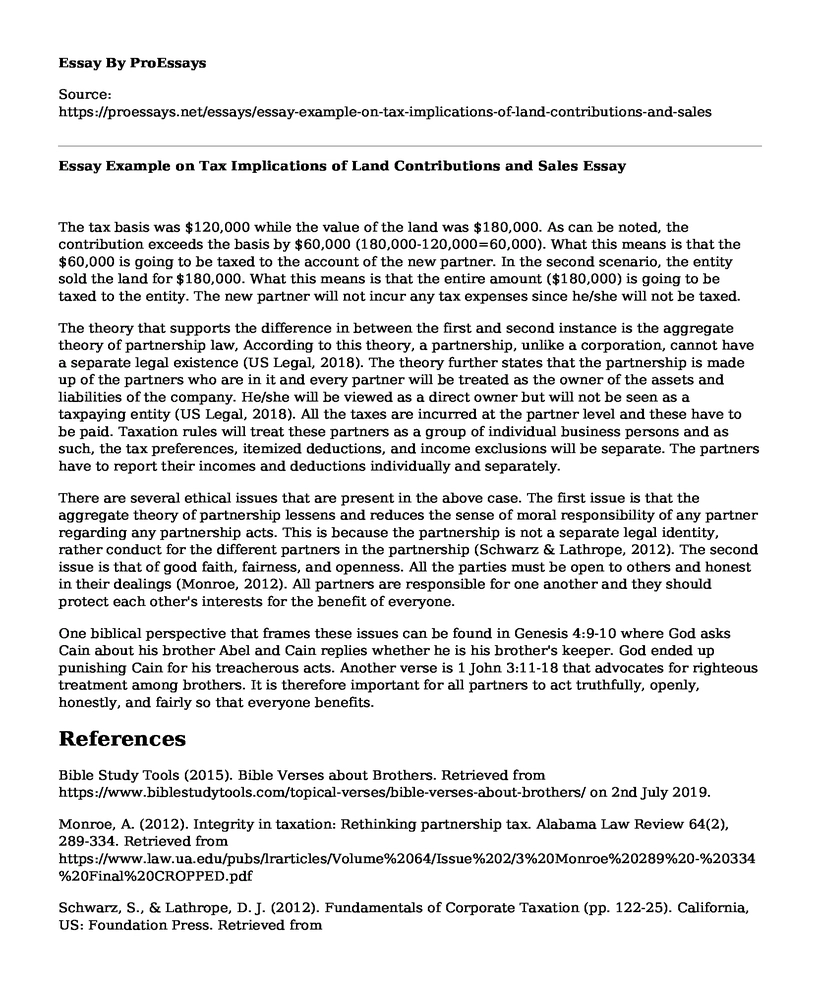The tax basis was $120,000 while the value of the land was $180,000. As can be noted, the contribution exceeds the basis by $60,000 (180,000-120,000=60,000). What this means is that the $60,000 is going to be taxed to the account of the new partner. In the second scenario, the entity sold the land for $180,000. What this means is that the entire amount ($180,000) is going to be taxed to the entity. The new partner will not incur any tax expenses since he/she will not be taxed.
The theory that supports the difference in between the first and second instance is the aggregate theory of partnership law, According to this theory, a partnership, unlike a corporation, cannot have a separate legal existence (US Legal, 2018). The theory further states that the partnership is made up of the partners who are in it and every partner will be treated as the owner of the assets and liabilities of the company. He/she will be viewed as a direct owner but will not be seen as a taxpaying entity (US Legal, 2018). All the taxes are incurred at the partner level and these have to be paid. Taxation rules will treat these partners as a group of individual business persons and as such, the tax preferences, itemized deductions, and income exclusions will be separate. The partners have to report their incomes and deductions individually and separately.
There are several ethical issues that are present in the above case. The first issue is that the aggregate theory of partnership lessens and reduces the sense of moral responsibility of any partner regarding any partnership acts. This is because the partnership is not a separate legal identity, rather conduct for the different partners in the partnership (Schwarz & Lathrope, 2012). The second issue is that of good faith, fairness, and openness. All the parties must be open to others and honest in their dealings (Monroe, 2012). All partners are responsible for one another and they should protect each other's interests for the benefit of everyone.
One biblical perspective that frames these issues can be found in Genesis 4:9-10 where God asks Cain about his brother Abel and Cain replies whether he is his brother's keeper. God ended up punishing Cain for his treacherous acts. Another verse is 1 John 3:11-18 that advocates for righteous treatment among brothers. It is therefore important for all partners to act truthfully, openly, honestly, and fairly so that everyone benefits.
References
Bible Study Tools (2015). Bible Verses about Brothers. Retrieved from https://www.biblestudytools.com/topical-verses/bible-verses-about-brothers/ on 2nd July 2019.
Monroe, A. (2012). Integrity in taxation: Rethinking partnership tax. Alabama Law Review 64(2), 289-334. Retrieved from https://www.law.ua.edu/pubs/lrarticles/Volume%2064/Issue%202/3%20Monroe%20289%20-%20334%20Final%20CROPPED.pdf
Schwarz, S., & Lathrope, D. J. (2012). Fundamentals of Corporate Taxation (pp. 122-25). California, US: Foundation Press. Retrieved from http://www.law.uh.edu/faculty/wstreng/ct2014/Schwarz-_corp_Tax_2014_Update.pdf
US Legal (2018). Aggregate Theory of Partnership Law and Legal Definition. Retrieved from https://definitions.uslegal.com/a/aggregate-theory-of-partnership/ 2nd July 2019.
Cite this page
Essay Example on Tax Implications of Land Contributions and Sales. (2023, Jan 26). Retrieved from https://proessays.net/essays/essay-example-on-tax-implications-of-land-contributions-and-sales
If you are the original author of this essay and no longer wish to have it published on the ProEssays website, please click below to request its removal:
- Litigation, Censures, and Fines
- Cryptocurrencies and Blockchain Technologies: Bitcoin and Ripple (XRP)
- Voluntary Income Tax Assistance Essay
- Planning and Budgeting in Pharmacy Services - Paper Example
- Essay Sample on Industrialization's Impact on Environment: The Global Challenge of Contaminants
- NYSE & NASDAQ: Investing in the World's Leading Market Exchanges - Essay Sample
- Mutual Funds: Investment Strategy & Professional Money Managers - Essay Sample







